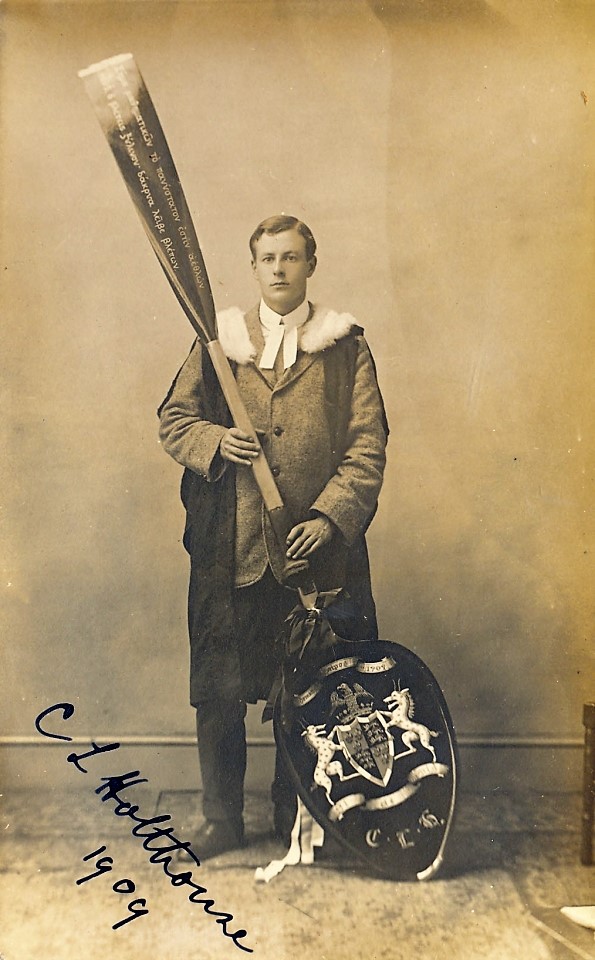
The last Wooden Spoon was awarded in 1909 to Cuthbert Lempriere Holthouse.—image: University of Cambridge
MEANING
wooden spoon: an imaginary prize said to be awarded to the person who is last in a race or other competition
ORIGIN
At the University of Cambridge, an over-sized wooden spoon was traditionally presented to the last of the junior optimes, that is to say, the lowest of those taking honours in the Mathematical Tripos¹. The term wooden spoon was applied to this position in the examination and to the person who took it. The University of Cambridge explains that, up until 1909, the results were not published in alphabetical order:
Mathematical Tripos examiners listed honours graduates in continuous order of merit, divided into three classes: wranglers, senior optimes and junior optimes. Tremendous prestige attached to being senior wrangler (head of the list) and notoriety to the man at the bottom. He was dubbed, and received from his friends, the wooden spoon.
[…]
On degree day, the spoon was suspended on strings held by two friends in the Gallery of the Senate House so that the spoon hung above the graduand as the degree was awarded. When the graduate arose from his/her knees, the spoon was lowered to the ground and two other friends cut the string and presented the spoon to the individual concerned. The proceedings were carried out with the utmost ceremony and decorum with the tolerant consent of the Vice-Chancellor.
(¹ Tripos: the final honours examination for a BA degree at Cambridge University)
The Century Dictionary (New York, 1904) thus defined wooden spoon:
(a) At Cambridge University, the student whose name stands last in the Mathematical Tripos.
b) At Yale², formerly, the student who took the last appointment at the Junior Exhibition; later, the most popular student in a class.
(² Yale University, in New Haven, Connecticut)
The earliest instance of wooden spoon that I have found is from Ambiguous Expressions at Cambridge elucidated, by “a Cantab” (i.e. a Cantabrigian, a member of Cambridge University), published in The Gentleman’s Magazine: and Historical Chronicle (London) of January 1795:
It may not perhaps be improper to mention one very remarkable personage […]. I mean “The Wooden Spoon.” This luckless wight (for what cause I know not) is annually the universal butt and laughing-stock of the whole senate-house. He is the last of those young men who take honours, in his year, and is called a junior optimé; yet, notwithstanding his being in fact superior to them all, the very lowest of the οἱ πολλοί³, or gregarious undistinguished batchelors [sic], think themselves entitled to shoot the pointless arrows of their clumsy wit against the wooden spoon; and to reiterate the stale and perennial remark, that “wranglers are born with gold spoons in their mouths : senior optimés with silver : junior optimés with wooden : and the οἱ πολλοί with leaden ones.”
(³ Greek οἱ πολλοί (= hoi polloí), literally the many, is used in the sense of the masses, the common people; formerly, in university slang, it denoted the candidates for a pass degree.)
Gradus ad Cantabrigiam: or, A Dictionary of Terms, Academical and Colloquial, or Cant, which are used at the University of Cambridge (London, 1803), by “a Pembrochian”, contains the following:
Wooden spoon, for wooden heads: the last of those candidates for the degree of A. B. who take honours: the lowest of the Junior Optime’s. After wooden spoon, follow the οἱ πολλοί. It is an old saying, that, Wranglers are born with gold spoons in their mouths, Senior Optime’s with silver, Junior Optime’s with wooden, and the οἱ πολλοί with leaden ones! “What is heavier than lead? and what is the name thereof, but a fool?” (Ecclesiasticus 22:14)
These two documents allude to the silver spoon, a customary and valuable baptismal gift from godparents to a child as a symbol of future plenty—cf. the phrase to be born with a silver spoon in one’s mouth, meaning to be born into affluence.
The 1824 edition of Gradus as Cantabrigiam, by “a brace of Cantabs”, contains the addition of the shortened form Spoon:
The last of each class of the honours is denominated The Spoon. […] This invidious distinction sticks to a man through life.
In 1824 at Cambridge, the Classics examiners decided to award prizes to their candidates in the first ever Classical Tripos and debated by what name to call the last on the list. As the last-listed candidate happened to be Hensleigh Wedgewood⁴, they punned on his name and gave him a wooden wedge. Up until 1909, the last on the list in the Classical Tripos received a wooden wedge and was called the Wedge.
(⁴ Hensleigh Wedgewood (1803-91): British etymologist, philologist and barrister, author of A Dictionary of English Etymology)
